|
It's been a busy year in the fortune-hunting business. Strong
equity markets combined with rising real estate values and commodity
prices pushed up fortunes from Mumbai to Madrid…
That's how a special report
on the world's Billionaires in Forbes begins. The magazine's got
it right, what with 36 Indian billionaires featured in the list
of 946. Turn the spotlight on India (and think in rupees), and
you'd discover there's a billionaire tucked away in every nook
and cranny of Dalal Street. Well, almost. With the primary market
on fire in 2005-06, the list of promoters whose personal wealth
has crossed a billion smackers-or Rs 100 crore-is long. A few
have gone on to pierce the Rs 1,000-crore barrier (the market
wealth of the billionaires featured in BT is in the Rs 800-1,750
crore range, although the figures keep changing along with share
price movements). (All the six promoters featured have raised
money from the primary markets over the last 16 months.)
The caveats: The floating stock of many of these companies is
low. Also, two billionaires are real estate developers, a volatile
industry. Like many billionaires in the past, there's little guarantee
of these new Richie Riches riding the long haul. BT believes the
journey till the present and the possibilities that lie ahead
deserve to be chronicled. Here are those men and their magnificent
stories:
Shashi Kiran Shetty 49
Chairman & Managing Director/ All Cargo Global Logistics
Ltd
MARKET WEALTH: Rs 1,638 crore
|
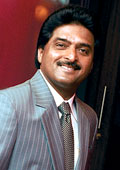 COMPANY
SCORECARD COMPANY
SCORECARD
Stock Performance: Market
price of Rs 1,060 per share; a 57 per cent appreciation
in nine months since public offering at Rs 675 per share
Financials: Turnover
of Rs 272 crore and net profit of Rs 49 crore in 2005-06
Industry: Cargo
& Logistics
Upside: Growing
share of high margin container freight business and acquisition
of Belgium-based Ecu Line will de-risk the company's business
Risk factor:
Low entry barriers in MTO business, hence competition to
intensify and any decline in country's exports and imports
will affect the company's future
|
Shashi Kiran Shetty landed in Mumbai
from his native place Mangalore with a degree in commerce and
a dream to make it big. The year was 1978 and he was just 21.
The first four years were tough. Working in the operations and
marketing department of Intermodal Transport and Trading Systems,
a logistics company, Shetty learnt the nuances of the cargo business.
Subsequently, he shifted to Tata Group company Forbes Gokak. "While
working, I saw lot of opportunities in cargo," says Shetty
who, by that time, had a strong pool of existing relationships
with clients. Those relationships proved handy when Shetty, at
25, set up Transindia Freight Services, a transportation company
catering to shipping liners. He started with a seed capital of
Rs 25,000 of hard-earned savings. Operating from a small rented
office near Mumbai's VT Station with four people, Shetty started
handling cargo at the Mumbai Port. He later expanded to cover
cargo of projects in the power and oil and gas sectors. Shetty
later incorporated a new company, All Cargo Global Logistics,
as a clearing and forwarding (C&F) agent of Asia Lines, a
Mauritian shipping line. Shetty was clearly on his way when he
obtained an mto licence (multimodal transport operator) and formed
an alliance with the Belgium-based Ecu Line NV to be its agent
in India. After a decade-long association, Shetty eventually acquired
Ecu in 2005, which provided him access to the Belgian company's
110 offices in 56 countries (in India, All Cargo has a pan-India
presence across 26 locations through branches and franchises).
Over the past one year, Shetty has cleaned up the balance sheet
of Ecu Line by hiving off its non-core operations and bringing
in a new management. Post-acquisition, All Cargo Global has grown
from a Rs 272 crore firm into a Rs 1,500-crore company (in 2006-07).
"We now expect to grow by 20-22 per cent on a larger base,"
says Shetty, who spends time with his wife and two kids when he
isn't living out of his suitcase-Shetty travels roughly 10 days
a month.
Last fortnight, Shetty's market wealth, by virtue of his 75
per cent holding in All Cargo, stood at Rs 1,638 crore. It's not
just that figure that makes Shetty proud. "We are a company
with low capital and high returns. Our return on investment is
higher than that of the industry," beams the golf enthusiast
whose vision is to make All Cargo a truly international company.
Perhaps, he'll be a dollar billionaire by then!
Shantanu Prakash 41
Managing Director/ Educomp Solutions Ltd
MARKET WEALTH: Rs 984 crore
|
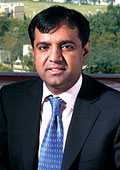 COMPANY
SCORECARD COMPANY
SCORECARD
Stock Performance: Price
of Rs 951 per share, an appreciation of 660 per cent since
14 months of getting listed; offer price was Rs 125
Financials: Turnover
of Rs 54 crore and net profit of Rs 14 crore in 2005-06
Industry: Education
Upside: Large
untapped e-education market and the rising government spending
on education offers tremendous scope for upside
Risk factor:
The company may face stiff competition in the US market,
which is highly competitive. The internet penetration and
computer awareness is still very low, while mobile is set
to revolutionise the market
|
After graduating from IIM Ahmedabad
in the late eighties, Shantanu Prakash had a very good reason
for turning entrepreneur: Pay-packets weren't seductive enough
on the eight-hour shift in the private sector. "These days,
it's a different story of course," grins Prakash. The low
salaries on offer prompted Prakash to team up with a few friends
in a quasi-entrepreneurial education venture once out of campus
in 1988. "That's when the initial grooming happened and I
learnt the business nuances," recollects Prakash. Some eight
years later, Prakash formed his own company, Educomp Solutions
Ltd, to set up computer labs in private and government schools.
The big challenge, though, was mobilising capital as banks insisted
on collateral, which Prakash didn't have. "I used to take
finances from nbfcs (non-banking finance companies) that used
to charge a hefty interest rate," he shrugs. But Prakash
was clear that computer education was poised for a boom. Starting
from a 600 square feet basement office in Delhi's Kalkaji, near
Nehru Place, Prakash gradually expanded his business. By 1998,
he had launched an e-campus, and the dot-com boom at the turn
of the century swayed Prakash into launching an educational portal,
planetvidya.com. The website sank without a trace as the internet
bubble burst. "The portal was a little ahead of its time,"
says Prakash, who moved on to other businesses in the education
space. "The inflection point came when Educomp entered into
digital content production and professional development of teachers,"
adds Prakash. Educomp, which has hit annual growth rates of over
100 per cent, today commands a near-monopoly in this segment.
Attracting capital wasn't a huge problem anymore, what with the
likes of us buyout fund Carlyle picking up a 15 per cent stake
in Educomp for Rs 11.25 crore. Prakash saw a big opportunity in
the US for tutoring mathematics over the net. In January 2005,
he started Mentoraide, with Indian mathematics teachers instructing
us students online. "It hardly matters whether I'm a millionaire
or a billionaire," shrugs Prakash. "The stock market
has given us currency and visibility."
Shashikant Patel 60
CMD/ Plethico Pharmaceuticals
MARKET WEALTH: Rs 972 crore
|
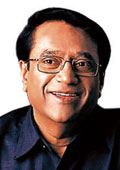 COMPANY
SCORECARD COMPANY
SCORECARD
Stock Performance: Current
market price of Rs 328 per share, which is an appreciation
of close to 10 per cent since the public offering of Rs
300 per share 11 months ago
Financials: Turnover
of Rs 378 crore and net profit of Rs 88 crore for the year
ended September 2006
Industry: Pharmaceuticals
Upside: Foray
into herbal products can bring big bucks and lucrative exports
market
Risk factor:
Single product 'Travisil' contributes significantly to revenues,
close to 15 per cent
|
He's the oldest-or should we say
the most experienced-billionaire on this list, having begun his
entrepreneurial sojourn when the likes of Shantanu Prakash of
Educomp weren't even born. Shashikant Patel, a science graduate,
along with elder brother Bhaskar, launched Plazma Laboratories
as a small formulations maker way back in 1963. In 1978, the duo
flagged off Ethico Drugs & Chemicals Manufacturing to produce
branded generic antibiotics. Plethico Pharmaceuticals was launched
in 1985 to focus on marketing and distributing drugs in the ethical
and prescription segments. In the early '90s, the company was
converted into a public limited company.
But it was some 10 years ago when Patel bit the bullet. Rather
than being just another pharma player in the allopathic area,
he decided to focus on the herbal market. The gambit clearly was
an attempt to move out of the ambit of the product patent regime,
which makes it difficult for companies to re-engineer existing
molecules. It appears to be working well so far, with a little
over half of Plethico's revenues of Rs 330 crore in 2005-06 coming
from the herbal portfolio. "It was a strategic shift and
a much safer bet," avers Patel, Chairman & Managing Director,
Plethico.
Patel today gets by with a little help from his son and daughter.
Son Chirag, who came on board in 1996, is the Chief Executive
Officer of Plethico. Chirag was instrumental in initiating exports
to Russia, Africa and Eastern Europe soon after joining the business.
Daughter Gauravi, who joined in 2000, looks after regulatory affairs
and new product development. Patel has a vision to make the company
a global healthcare conglomerate by 2010, focussing on herbals
and nutraceuticals. His aim is also to make Plethico a Rs 1,000-crore
company by 2010. "Shashikant bhai believes in decentralising
operations and delegating decision-making powers to the team below,"
says Sanjay Pai, CFO, Plethico. That team can take some credit
for the billionaire's riches.
Bhadresh Shah 54
Managing Director/ AIA Engineering Ltd
MARKET WEALTH: Rs 1,467 crore
|
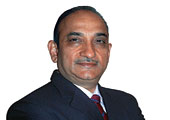 COMPANY
SCORECARD COMPANY
SCORECARD
Stock Performance: Price
of Rs 1, 200 per share, a 272 per cent appreciation from
offer price of Rs 315 per share in just 15 months of listing
Financials: Turnover
of Rs 308 crore and net profit of Rs 37 crore in 2005-06
Industry: Alloy
Steel and Iron Casting
Upside: User
industry cement, mining and power are on an upswing. High
export turnover at 30% is a growth driver
Risk factor:
Large dependence on cement industry. Shortage and price
escalation in raw material could adversely affect the company
|
His billions may be mint-fresh,
but that doesn't mean Bhadresh Shah (54) himself is a tenderfoot
in the business world. A metallurgical engineer from IIT Kanpur,
Shah started making small alloy castings in Gujarat way back in
1976. Two years later, he founded Ahmedabad Induction Alloys Pvt
Ltd to produce steel, alloy steel and alloy iron castings used
in the cement, utility and mining industries. A first-generation
entrepreneur, Shah realised that an overseas alliance would be
the best way to gain know-how. He first collaborated with Magotteaux
of Belgium in 1991, which set up Magotteaux India Pvt Ltd, a joint
venture, which was subsequently merged into Ahmedabad Induction
Alloys. The idea was to specialise in high-chrome, which is used
in crushing and grinding operations in industries like cement,
mining and quarrying. The idea was right but the partner wasn't.
Magotteaux decided to exit India in 2001, but by then Shah had
already roped in South Western Corporation (SWC) of the us in
2000 as technical collaborator. By May 2001, he changed the company's
name to AIA Engineering. Today, Shah has a wide range of blue-chip
clients from the cement sector that include acc, Gujarat Ambuja,
Aditya Birla Group's Ultratech, Holcim and Lafarge. Like many
other Indian industrialists, Shah, too, is looking at creating
an international footprint; he's looking for opportunities to
acquire global mines and power utility in markets like North and
South America and South East Asia. His competition today is distinctly
global with AIA Engineering pitted against the likes of Toyo of
Japan, Christian of Italy and Shah's former ally, Magotteaux.
Yet, Shah doesn't appear to be doing too badly for himself, what
with close to 40 per cent of AIA's sales coming through exports.
The next step is, of course, to create a base in an overseas geography
that's closer to AIA's target markets.
Shah is notoriously media shy and preferred to avoid cooperating
with Business Today for this feature. Now, could that be
one of the many secrets of his success?
P.N.C. Menon 58
Chairman & Managing Director/Sobha Developers Ltd
MARKET WEALTH: Rs 1,733 crore
|
 COMPANY
SCORECARD COMPANY
SCORECARD
Stock Performance: Quoting
at Rs 803 per share, 25 per cent appreciation as against
the offer price of Rs 640 per share three months ago
Financials: Turnover
of Rs 628 crore and net profit of Rs 89 crore in 2005-06
Industry: Real
estate development
Upside: Promoters
with global experience. Plan to enter into development of
SEZ, malls, multiplexes and retail business
Risk factor:
Real estate valuations are at abnormally high level. The
company's business has high concentration in Bangalore and
southern areas
Menon's wife Sobha Menon, also a promoter,
has market wealth of Rs 3,320 crore |
Most entrepreneurs take along with
them through the years something they cherish, and which eventually
assumes sentimental significance. In the case of P.N.C. Menon,
it's a table he bought 30 years ago when he embarked on his entrepreneurial
journey in Oman. Even today, he works (and even eats) over that
same table.
Menon's first job was in a photo studio, where he earned 400
Omani riyals a month, equivalent to $1,000 those days. But by
24, Menon, a university dropout, had had enough of dark rooms
and photofinishing. He turned interior decorator, a bold move
considering Indians in West Asia were known more for their unskilled
and semi-skilled prowess than for precision jobs. A move into
the construction business would appear a giant step for most mortals.
Not for an ambitious Menon, however, whose company, Services &
Trade Company, in quick time emerged as one of Oman's leading
developers.
By the mid-nineties, however, India beckoned. He floated Sobha
Developers in 1995 (named after his wife, who is also a director
on the board of the company), and made Bangalore its headquarters.
"The shift to India was made to de-risk the business,"
says Menon. Today, the 12-year-old Indian operations are four
times the size of the portfolio in the Gulf. Looking back, Menon
says India became a huge dot on his radar when he saw shoddy construction
work in India (vis-a-vis in Oman). "I even brought in some
100 workers initially from the Gulf to work on my first Indian
project," says Menon, who launched his first residential
project, 'Oman Topaz' in Bangalore.
Today, big corporates like Infoys, Timken and RMX Group are
his clients. A citizen of Oman, Menon keeps shuttling between
India and Gulf not just to look after his business interests in
both countries, but to also be with his family, which has made
Oman its home. "Our strength lies in our delivery capability
as we don't sub-contract any job," says Menon, who believes
being a billionaire on Dalal Street is a matter of pride, but
one shouldn't get too carried away by the wealth created.
He's aware of his social responsibility, although he doesn't
believe charity is the way to go about it. "I hate the word
charity," points out Menon, who's adopted two villages with
a combined population of 80,000 in Kerala, where he focusses on
education, health, water and related issues. Given such a bent
of mind, perhaps it's only a matter of time before projects for
rural housing make their way onto his drawing board.
B.L. Kashyap & Brothers
Vinod Kashyap /53/ Executive Chairman (left)
Vineet Kashyap /51/ Managing Director (right)
Vikram Kashyap /44/ Joint Managing Director (centre
MARKET WEALTH: Rs 837 crore
|
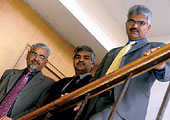 COMPANY
SCORECARD COMPANY
SCORECARD
Stock Performance: Price
of Rs 1,152 per share, a 68 per cent appreciation since
offer of Rs 685 per share a year ago
Financials: Turnover
of Rs 468.80 crore and net profit of Rs 28 crore in 2005-06
Industry: Real
estate development
Upside: Established
client base like IBM, Microsoft Oberoi and Hyatt Hotel.
Aspiring to become a complete building solutions company
Risk factor:
Valuations in the construction business are abnormally high.
The company's new business line, furnishing & fitting, is
yet to achieve scale
|
The value of his company on the
stock markets is a few thousand crore today, but the irony is
that Vinod Kashyap had to sell the few shares he owned as an investor-the
shares of Escorts he had bought during his college days with his
pocket money -to fund his ambitions. "I put the entire sale
proceeds of some Rs 65,000 into a new partnership business,"
reminisces the eldest of three siblings, who at one time was keen
to become a doctor but changed his mind to study arts at the Delhi
University's Hindu College.
Being the son of a construction magnate has its benefits, and
Kashyap after graduating, duly went on to join his father's firm
in 1973. He started at the ladder's lower end. "I worked
as a trainee for five years," says Kashyap, whose initial
job profile was to visit construction sites and oversee development
work. In the next few years, Kashyap learnt a lot, including one
vital lesson: Quality and on-time delivery matter most in an industry
that was unorganised and unprofessional (it still is largely that
way).
By 1977, Kashyap was ready to take a crack at emerging out of
his father's long shadow. Along with his two younger brothers,
Vineet and Vikram, he floated B.L. Kashyap & Company. Over
the next 12 years that company plodded along and, by 1989, it
was doing a decent, if unspectacular, turnover of a little under
Rs 25 crore. Things changed once the partnership firm was converted
into a public limited outfit. The work remained the same, only
the scale got larger. And the tempo got faster. "SmithKline's
factory at Sonepat in Haryana was a project close to my heart;
it was completed in just 18 months," beams Kashyap, the Executive
Chairman of the company. The three brothers together hold 70 per
cent of its shares, with 30 per cent being offloaded to investors
in February 2006. Whilst the Chairman oversees operations, Vineet
handles marketing and Vikram nurtures the new businesses like
home furnishing and interiors.
Doubtless, B.L. Kashyap's biggest growth phase has been over
the past five years, with revenues spurting at a cumulative annual
rate of 80 per cent over this period. Kashyap's vision is to make
B.L. Kashyap the biggest construction company in India. "The
potential to grow manifold is huge," he points out. The over-exuberance
in this sector notwithstanding, it's difficult to disagree with
him.
All wealth figures are based on
March 30, 2007, closing on the NSE
|
Simple Living, Strategic
Thinking
No private jets, no lavish yachts,
no palatial properties, no flashy cars… India Inc.'s
new billionaires prefer to keep it simple.
|
 |
| Teeing off: All Cargo Global's
Shetty |
Warren Buffett is the second
richest man in the world, according to the Forbes 2007 list
of wealthiest people. He's also one of the thriftiest. As
the magazine notes, Buffett "recently traded in a six-year-old
Lincoln Town Car for a 2006 Cadillac DTS. Granted those are
both luxury cars. But these traditional American sedans cost
a fraction of the price of a Bentley or a Rolls-Royce and
are frumpy compared to exotic sports cars". India's new
billionaires would appear to have taken a leaf out of Buffett's
book on frugality. No Bentleys or Rolls-Royces or Ferraris
or Lamborghinis for them-four of the six billionaires featured
in BT have a Mercedes in their garage, a car that doubtless
screams "I've arrived," but which doesn't exactly
put across the exclusivity and glitter you'd expect of a well-heeled
billionaire. What is more, Shantanu Prakash of Educomp Solutions
is happy driving a Hyundai Sonata to office, and Bhadresh
Shah is fastidious about staying away from foreign cars!
But then again, like Buffett, India Inc.'s new billionaires
are perfectly comfortable without the dazzle, and away from
the spotlight. Most of them extol the virtues of simple
living-for instance, home food invariably overrides five-star
spreads and domestic vacations are, by and large, preferred
to exotic overseas escapes. Simply put, these entrepreneurs
are uncomfortable with the billionaire tag, and tend to
flush and squirm when any reference is made to their market
wealth.
Prakash of Educomp hasn't yet ventured on a foreign holiday.
In fact, he hasn't taken a vacation at all in the past couple
of years. But he threatens to get away-and when he does
it, he hopes to travel really far. "I don't know when,
but if I get time, Alaska will be my destination,"
quips Prakash, who lives in Gurgaon. Shashikant Patel of
Plethico Pharma does embark on vacations-but that's only
when the family forces him to do so. And Vinod Kashyap of
B.L. Kashyap proudly lets on that "I recently went
to Rishikesh. My holiday destination is the hills."
Sartorial elegance may also not be high up on the priority
list. Patel, who has been living in suburban Mumbai for
many years now, still prefers to wear a safari suit to office.
Business suits are strictly for meetings only. P.N.C. Menon
of Sobha Developers, however, is one promoter who's particular
about what he wears, and is most often seen immaculately
dressed in black office suits. A close acquaintance of Menon
reveals "he has a good collection of ties".
Menon, who stays in Bangalore's Ulsoor area, may have
a thing for clothes, but his tastes are hardly Bohemian.
In fact, he just turned vegetarian last December. "Menon's
interest in spirituality resulted in him becoming a veggie,"
explains the acquaintance, who adds that Menon makes it
a point to exercise daily despite his busy schedule.
One of the few indulgences for these tycoons is predictably
golf. Shashi Kiran Shetty of All Cargo Global and AIA Engineering's
Bhadresh Shah are avid golfers; Shah has been swinging the
clubs for the past 12 years. Vinod Kashyap of B.L. Kashyap
& Sons seldom misses his evening session of yoga. If
you don't see them on a midnight romp through town or strutting
their ample stuff on page three, that's because: One, their
billions are self-made and not inherited; and, two, middle-class
values are often underrated.
|
|





 COMPANY
SCORECARD
COMPANY
SCORECARD COMPANY
SCORECARD
COMPANY
SCORECARD COMPANY
SCORECARD
COMPANY
SCORECARD COMPANY
SCORECARD
COMPANY
SCORECARD COMPANY
SCORECARD
COMPANY
SCORECARD COMPANY
SCORECARD
COMPANY
SCORECARD